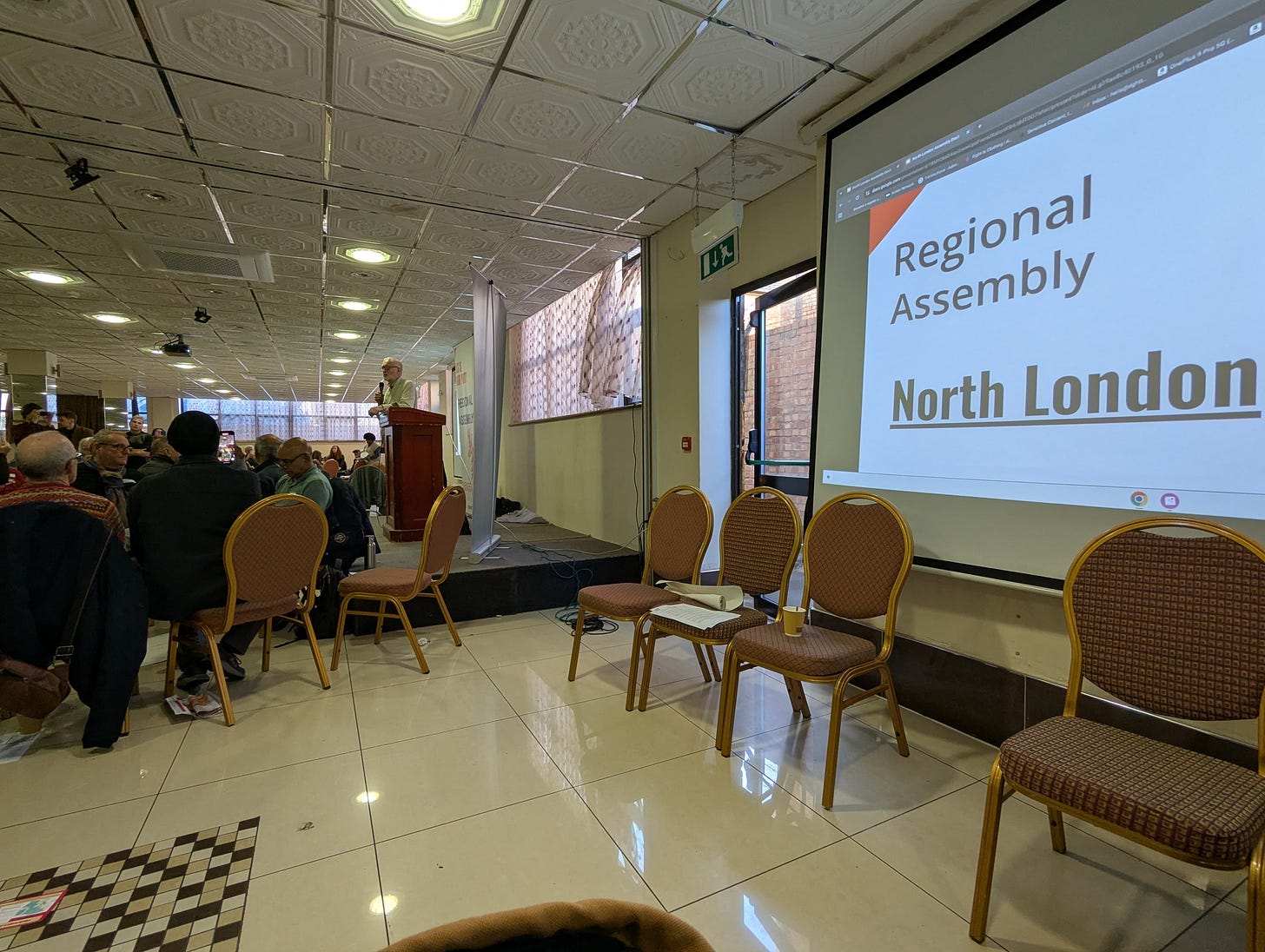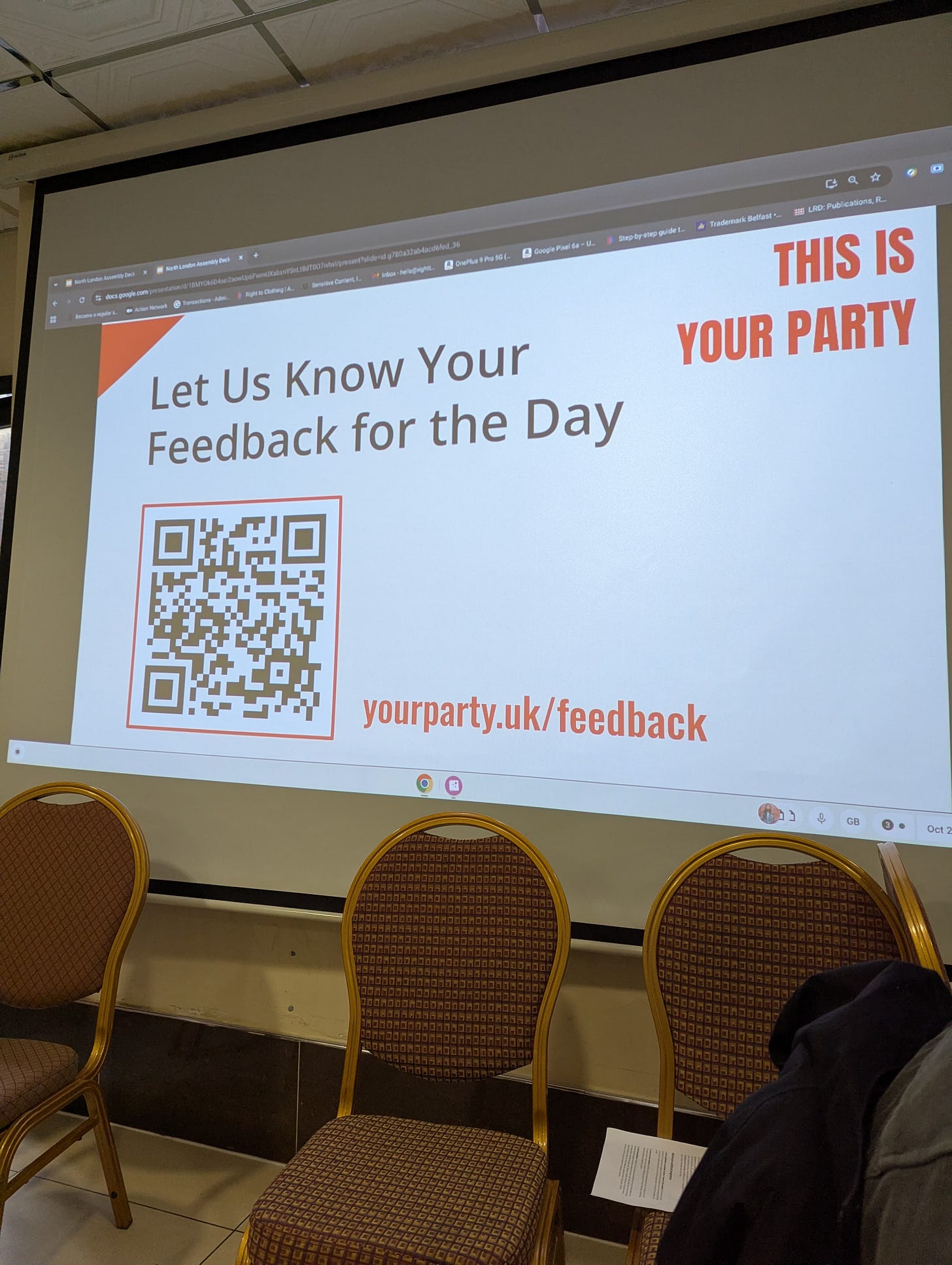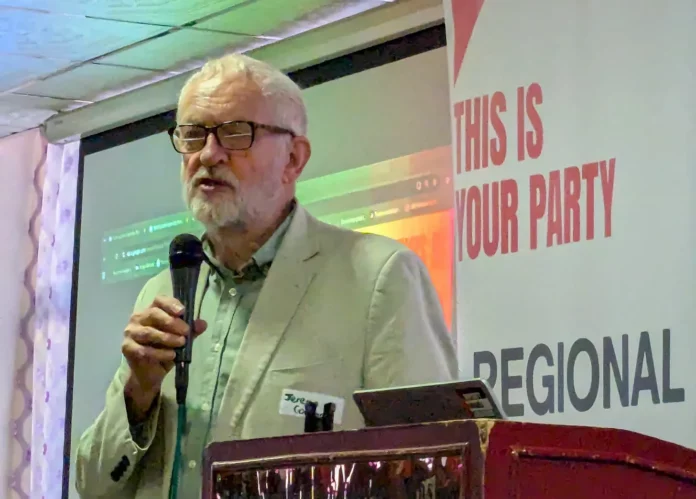Internationalist Standpoint is publishing an article by Dustin Spence, a socialist that has moved from Chicago to London. This piece was published in the Substack page of US-based organization Solidarity Now. If you want to find out more about Solidarity Now and read their updates you can go to https://solidaritynowcollective.substack.com/
I am a Chicagoan living in the UK. I arrived in London with my family on September 8th; on the 9th, Donald Trump launched Operation “Midway Blitz”, sending ICE and DHS goons to terrorize Chicago neighborhoods. While workers and children are being kidnapped off the streets of the neighborhood where we’ve been raising our son, and clouds of tear gas envelop the sidewalks of the city that my wife and I called home for the last 20 years, we are all of us here in London waiting for what comes next. It is in that waiting that I’ve joined Your Party. Jeremy Corbyn and Zarah Sultana’s new left socialist party has been struggling to be born, but the enthusiasm of the 800,000 people who have signed up for membership is a reflection of the clear need for a real alternative for working and oppressed people in the UK and indeed around the world. The betrayals of Keir Starmer’s Labour government, from the genocide in Palestine to the crackdown on civil liberties and beyond, have led to a steady stream of resignations from both elected and rank-and-file Labour Party members, with a great many joining Your Party.
It is in this atmosphere that Your Party members have been attending Regional Assemblies across England, Wales and Scotland. Members were informed by Your Party leadership that everyone should try to attend a Regional Assembly, and that, due to concerns with capacity, all members would only be able to attend one of them. It was announced that the primary purpose of the Regional Assemblies was to discuss the four Founding Document drafts that were shared with the membership when the Assemblies were announced. Living in Northwest London my closest assembly (the North London Regional) was called for October 25th. I read the documents and prepared for a discussion.
Much has already been written about the documents themselves, and while I will touch on them in this report, there is not a significant amount I can say that has not already been said. What I am able to do is to highlight my experience from the assembly itself – the ways in which it was significant and those in which it fell short.
It should be noted from the beginning that having three assemblies (North, South and West) scheduled for London is significant compared to the rest of the UK where members are lucky to have one assembly in their area to attend. However, it was clear from the offset that “North London” didn’t simply mean Londoners from North of the River (as the phrase often goes), but instead that attendance was centered (unsurprisingly) on the areas around Jeremy Corbyn’s Islington North constituency. While I was told that there might be a West London assembly scheduled, given that this key area was missing from the original list of Assemblies, seemingly very few persons from West London were registered as Your Party members. This glaring omission in recruitment, particularly from London’s working class and heavily immigrant Northwest, is a reflection of the lack of grassroots structures currently in place within Your Party. There is no method for rank-and-file members to canvass their areas, set up meetings, or establish area branches (more on this later). Your Party activities are currently organized mostly by the party centre or existing activist groups whose members have affiliated with Your Party. This lack of grassroots structure was a significant point of discussion at the North London assembly, and a topic that I’ll return to.
The North London assembly was held in the Borough of Enfield in the community building of an area mosque. Arriving at the event, the street out front was lined with pamphleteers from various leftwing organizations – the Socialist Party, SEP, RCG and others. Walking through this gauntlet of the Left was largely the result of the proclamation by leadership that one could not be a member of another political party and a member of Your Party. Undoubtedly many in the assembly hall were there because they ignored this ban. The official presence of so many groups outside the hall rather than in the Assembly openly debating their ideas did nothing to stifle the politics of other groupings from percolating throughout the day.

Upon entering the hall, Assembly participants were presented with a meeting space filled with chairs arranged in small circles. Members were asked to check-in and then find a seat. We weren’t told what the purpose of the different circles was, nor what the agenda for the day would be. I was informed by a participant from the previous weekend’s Norwich assembly that I could expect the day to last seven hours. Thankfully, when the full agenda for the day was unveiled, we were told to expect only three and a half hours, which expanded into roughly five hours as the day unfolded. We learned that the chair circles we were arranged in would be our discussion groups for the day and that all political discussion would take place within the groups. Furthermore, rather than having an opportunity to discuss each of the four draft documents as previously advertised, each group would discuss a pre-selected section of each document and the assignment of which section was up to the random pairing of meeting facilitators with various groups. Most of the facilitators themselves had been selected by leadership in advance of the meeting, but when it was clear that there was a shortage, additional facilitators were drafted from those who arrived at the meeting hall early. While the introductory comments of the meeting, and those of Jeremy Corbyn himself (who addressed the meeting just before a meal break) stressed the unprecedented democratic and participatory nature of the day, there was no space provided to question the agenda or to propose an alternative structure for the meeting.
The discussion group that I happened to join was assigned the topic of “Branches” from the draft constitution and the topic of “Conference” from the draft standing orders. In total there were 70 minutes allotted to discuss both topics – 45 minutes for the former and 25 minutes for the latter. Needless to say this wasn’t nearly enough time to discuss the topics in depth, even more so because the Assembly attendees had not been given any advance notice that this is how the meeting would be run.
The discussion on Branches was by far the more lively discussion with all members having strong opinions on the ways in which Your Party branches should be established and maintained. Given that there are very few official Your Party groups established around the country, much of the conversation centered on how new branches would be launched. It was strongly felt that members in local areas should be able to establish branches, and that this meant the party centre would have to share membership information with the rank-and-file. Otherwise it would be impossible to determine how many members were in an area, how much of that membership was active and what financial resources the branch could expect. Members questioned the idea that branches had to be tied to electoral areas, and there was significant support for the launching of Your Party branches in workplaces and universities. An additional consideration was given as to how best to ensure that underrepresented voices were heard within Your Party from the beginning, with the idea being floated of the establishment of women’s and BAME branches. The discussion on how best to highlight these groups without further marginalizing or sidelining them proved inconclusive but important.
The significantly shorter conversation about the Conference section of the Standing Orders was primarily a discussion of selection (voting for conference delegates) versus sortition (the random selection of conference delegates by lottery). For the founding conference of Your Party, leadership has already decided that delegates would be selected using sortition due to the lack of party structures and ability to properly select delegates. This brought the group back to the previous discussion of why it was so necessary to establish clear party structures on an urgent and fully democratic basis. Otherwise any party decisions would be left to the centre without member oversight or input.
We were told that at the end of the day feedback from these discussions would be presented to the room as a whole. However, when that time arrived the leadership decided there was only space to present three or four (of the eleven plus) groups’ feedback points. It certainly was significant that Jeremy Corbyn was in attendance at the Assembly, that he gave a rousing speech before the meeting meal break and that he participated in various discussion groups, primarily there to listen and receive feedback from those in attendance. But the major take away from the day was that without any democratic structures and without those in the room being able to present proposals and vote on them, all of the decisionmaking of Your Party is currently in the hands of a very small leadership group. That group, which includes Corbyn and Zarah Sultana, is the sole arbiter on what is a valid suggestion and what is not.

The afternoon rounded out with a discussion of the draft political program, which, given its shorter length, was discussed in full. This discussion, within my group, largely centered on whether it was appropriate to define Your Party as a working class organization. The majority of the group argued in favor of the clear delineation of Your Party as a working class party, with a minority voice stating that the party shouldn’t limit itself to a class-based definition.
These criticisms of the Assembly (its processes, structure, content) should in no way be construed as a denigration of the Your Party project. In fact, the ability of so many people to come together in a room and largely disagree with the direction of the party centre, speaks to the critical need for Your Party at this time. Far from a sectarian, or purely activist endeavour, Your Party has sparked the hope and imagination of working class people across the UK. The question remains as to whether those who launched Your Party, namely Corbyn and Sultana, will allow the project to emerge with party power firmly endowed in the membership. With less than a month until the founding conference, and thousands of members still waiting to participate in a Regional Assembly, I hope this report will aid in the development of the party and will document lessons for those around the world (particularly in the US) who are also seeking to launch independent leftwing initiatives. Whether fighting against workplace oppression, the devastation of war and genocide, environmental destruction, or the hatred and bigotry of racism, transphobia, homophobia or xenophobia, our organizing must be international and must take inspiration and education from one another. I hope to write additional “Letters from Abroad” as my time in the UK unfolds with commentary and reportbacks from meeting halls and in the streets. To working and oppressed people around the world – solidarity!



